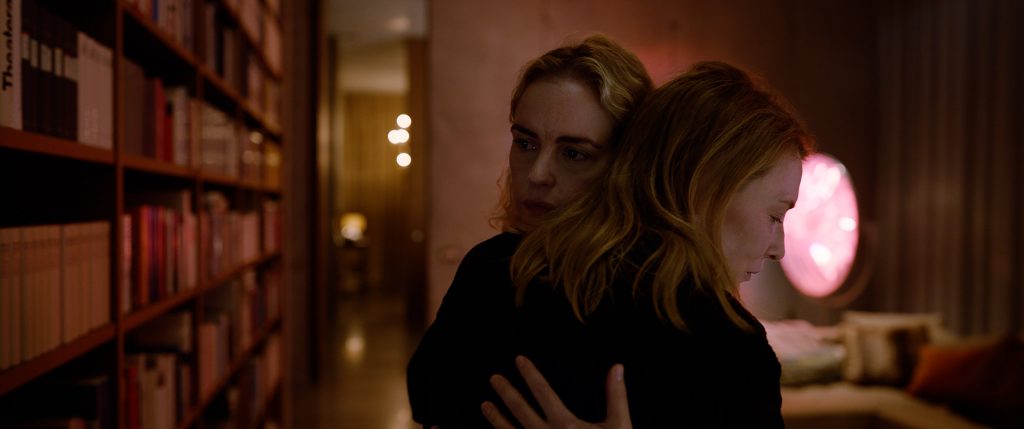Tár (2022) Review: Tár is writer/director Todd Field’s first film since 2006’s Little Children, and he opens it with a sweeping gesture of refinery and extravagance that might suggest he’s spent the last decade-and-a-half seeing the world and fashioning his latest opus from the tutelage of his inimitable influences. His decision to gracefully begin the film in darkness as the credits fade in and out to completion recalls the pomp and circumstance of the highbrow orchestral setting composer/conductor Lydia Tár (Cate Blanchett) considers her true home.
The cacophonous mix of ghostly music fit for a horror opera and diegetic sounds of the world outside the Berlin Symphony, which provides the backdrop for this first sequence, is enough to beguile us with the anticipation of seeing something greater than any one person could ever hope to accomplish. It’s also just enough to mislead us into thinking that Lydia has far more to accomplish than the incomparable legacy she has already attained by middle age.
Immediately, Field equates himself with his protagonist despite the differences in accessibility that would otherwise distinguish their respective industries. His film about the cunningly pretentious and realistically fictionalized Lydia could not kick into gear with a 15-minute interview with The New Yorker, in which Adam Gopnik (playing himself) details the CliffsNotes version of her EGOT-laden career with the kind of tactical precision she lives for, had the director not given us reason to believe he is just as qualified to reach the maestro’s milestones himself. The kicker is that Field, now 58 years old, has everything he needs for a latter-day resurgence, and he’s put himself in that position by making a film about someone whose artistic integrity is compromised by the ghosts of her past. Field’s stock is sure to rise with Tár, but Lydia’s is going down, and quickly at that.

An unparalleled figure in the world of classical music, Lydia presides over her orchestra as she prepares for a live recording of Gustav Mahler’s Symphony No. 5, a crowning achievement that will mark the end of her quest to conduct all ten of the storied composer’s symphonies. She has the adulation of her entire community and the unwavering devotion of her assistant Francesca (Noémie Merlant) and wife/violinist Sharon (Nina Hoss), with whom she shares an adopted daughter, Petra. She flaunts her experiences as a pupil and protégé of Leonard Bernstein and is unafraid to use her intellectual affinity for words to mock those who don’t give the classical composition its due credit for what she views as self-serving reasons.
It’s that blend of respect for her heroes and sense of entitlement over her contemporaries that likely fueled her ascension to the grandest podiums in the world as much as it’s about to inflame her sordid fall from grace. She’s the true self-server of her story whether she cares to admit it or not, her narcissism propounding a long history of power abuse and ignorance towards consequence. If it’s not recollections of a former student (Sylvia Flote) that threaten to do her in, it’s her favors and barely concealed attraction toward her ensemble’s newest member (Sophie Kauer). There’s always something to throw her off balance, yet Field and Blanchett effortlessly convince us of her brilliance nonetheless.
Even with two Academy Awards and five additional nominations to her name, Blanchett’s resumé and versatility across a variety of upscale and independent film productions don’t compare to Lydia’s. But her radiance in the role is the result of her extraordinary intensity and feverishness in portraying her character’s obsessive attention to detail both onstage and behind the scenes, not to mention her unwillingness to go down in a fight she’s already lost. The actress’s power is the most absolute it’s ever been, so much so that it becomes a question of how absolutely the musician’s power can be corrupted. Working from Field’s uneasy and dazzlingly claustrophobic screenplay, Blanchett cogently persuades us of Lydia’s place in an existing world of names that aren’t quite as known to the masses but are welcomed in with sycophantic arms by the few who are all in on their appeal. Her embodiment of a fictional musician practically creates a new template that will leave you questioning how the recent shift toward portrayals of real ones has resulted in a crop of films that largely fail to sort out their priorities even as they’ve all but cluttered popular culture. Blanchett doesn’t have biographical records or accounts from friends and family to work with, yet Lydia’s history and life story are richer, more kinetic, and more complicated than a cinematic virtuoso is typically granted.
Field’s accomplishments on paper and behind the camera evidence his ability to craft a multi-dimensional film for an audience compelled to stay swept up in the post-pandemic #MeToo zeitgeist. Tár is no filmic paragon of cancel culture because the director is unwilling to expose his personal criticism toward Lydia, if he has any, opting instead for a slower, contemplative look at the modern idea of fame and a carefully composed existence of privilege undone by vices and one too many retweets. It would seem far too simplistic a conclusion to say that the film doesn’t offer easy answers over the course of its two-and-a-half-hour runtime, but as Lydia, herself says of her duties to Gopnik and a captivated audience, “Time is the essential piece of interpretation. You cannot start without me. I start the clock.” As such, the film is keen to skew our understanding of the title character, and challenge the separation between artist and art, letting us into Lydia’s world away from the stage more so than any conventionally-minded work is willing to.
Field and cinematographer Florian Hoffmeister provide us with a strong understanding of Lydia’s grandiosity with only a few cuts to a tailor preparing her meticulously crafted suits and to the conductor herself making a few flattering updates to her Wikipedia page. A few close-ups of some scandalous emails Lydia is quick to delete, or insist that the increasingly distant, secret-keeping Francesca delete, have the opposite role of steadily mounting the revered maestro’s downfall. The verisimilitude the director and his photographer fashion in the remaining space, what with their ingenious concoction of several uninterrupted long takes, is never not on point; Blanchett consumes her share of the room with a fiery passion but is almost never at center stage. She inhabits her world like a true artist would, but it’s Field’s emphasis on the negative space — there’s a lot of it — that reminds us how small Lydia truly is, how quickly she can be overpowered, and how insignificant she will one day become.
Incredibly, Hoffmeister’s camera is never at too much of a distance from Lydia that we feel inclined to believe that Field is influencing what and how we should think of her. Instead, it’s as much of an observer of her decisions as it allows us to be: active in engagement, but leaning towards passivity in attempting to decipher them. How fitting it is that the same could easily be said of the symphonies Lydia has built a veritable consortium out of. Unlike such stunning music, however, Tár remains harmoniously discordant in the brutal exactness of Lydia’s life.
It’s a self-assured enough film that it doesn’t rush into making statements about its themes or characters that might weaken its execution or overstate its relevance. It’s a tour-de-force with the majesty of the gospel, but one that proudly defies the potential for preachiness.

![Bhonsle [2019]: ‘HFF’ Review – A Redefining Character Study](https://79468c92.delivery.rocketcdn.me/wp-content/uploads/2019/05/Manoj-Bajpayee-in-Bhonsle-2019-768x440.jpg)

![The Tragedy Of Macbeth [2021] Review – Joel Coen’s Retelling Of The Shakespeare Play Is A Classic In Its Own Right](https://79468c92.delivery.rocketcdn.me/wp-content/uploads/2021/12/The-Tragedy-Of-Macbeth-768x384.jpg)
![To Let [2019] Review – Yet another Moving Tamil Drama on the Perceived Injustices of Rapid Urbanization](https://79468c92.delivery.rocketcdn.me/wp-content/uploads/2019/02/To-Let-2019-768x403.jpg)
![System Crasher (Systemsprenger) [2019] ‘MAMI’ Review – An Intense Psychological Drama about a hot-tempered child](https://79468c92.delivery.rocketcdn.me/wp-content/uploads/2019/11/System-Crasher-Review-768x432.jpg)
